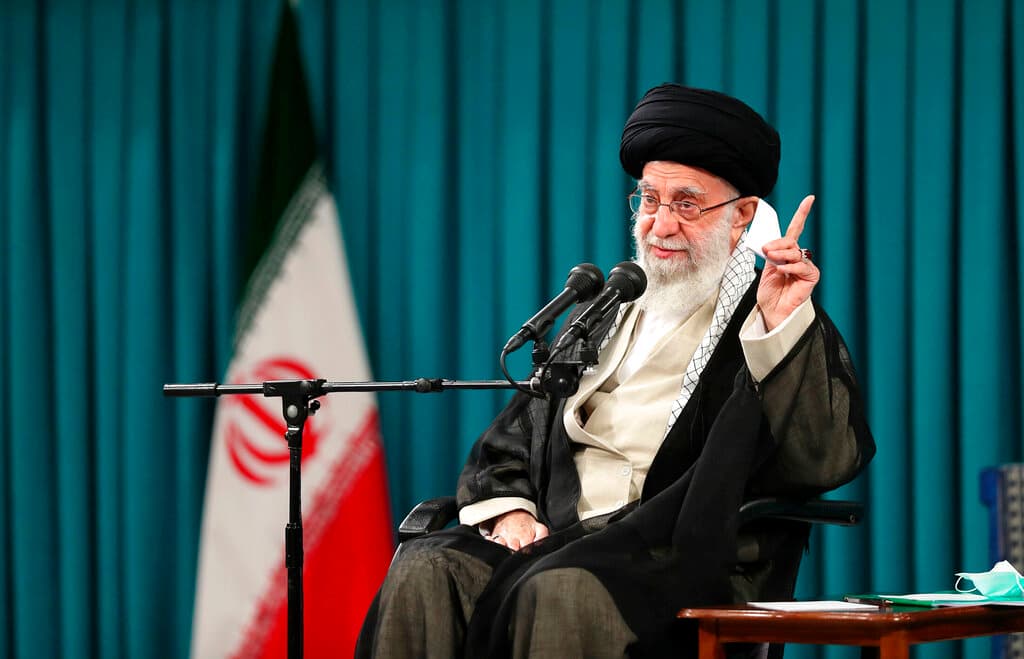Watch Iran’s ‘Sham Election’ To See Who’s Rising Within the Regime
‘The regime is picking winners, and Iranians are on to this schtick,’ one observer tells the Sun. Dissidents at home and abroad are urging a boycott, hoping past records for low turnout will be eclipsed on Friday.

Friday’s elections across Iran are widely seen as an exercise in regime hand-picking rather than a showcase of the Islamic Republic’s representative democracy, as voters are widely expected to shun polling places. Even so, the exercise can be useful in indicating whose stars are rising inside the regime and who has fallen out of favor.
Top regime officials are urging Iranians to show support for the country’s political process. Voters are being called upon to pick representatives for 290 seats in the Tehran parliament, the Majlis, as well as members of the Assembly of Experts. Yet dissidents at home and abroad are urging a boycott of the “sham election,” where real choice is extremely limited.
“According to one internal poll, between 20 and 25 percent of eligible voters will actually vote,” an Iran watcher at Tel Aviv University’s Institute for National Security Studies, Beni Sabti, tells the Sun. “Even if they fudge the numbers upwards, they can’t lie too much. The regime is picking winners, and Iranians are on to this schtick.”
Iranians at home and abroad, therefore, are urging a boycott, hoping past records for low turnout will be eclipsed on Friday.
“I, alongside the informed and proud people from all over Iran” will “stand to declare the illegitimacy of the Islamic Republic and the divide within the oppressive regime and its people through the sanctioning of sham elections,” the October 2023 Nobel peace laureate, Narges Mohammadi, writes from the notorious Evin prison.
Several regime organs that are largely controlled by Supreme Leader Ali Khamenei are authorized to disqualify candidates who may dissent from the party line, or who are no longer trusted by the powers that be. Earlier this year the Guardian Council, a group of 12 jurists, half of whom are hand-picked by Mr. Khamanei, nixed the candidacy of a former president, Hassan Rouhani, to join the Assembly of Experts.
The most important role of that group of regime loyalists is to handpick the next supreme leader. Its 88 members, known as Mujtahids, are elected to serve a term of eight years. In that time span Mr. Khamenei, who will turn 85 in April and is reported to be in bad health, is likely to leave the stage.
“Rouhani’s disqualification is important,” the policy director at United Against Nuclear Iran, Jason Brodsky, tells the Sun. “It shows that Khamanei does not take chances by installing people he doesn’t trust” in the Assembly of Experts. “He wants his legacy to be preserved” by ensuring that the next top ayatollah would continue his policies.
The election for the Majlis is less significant than for the Assembly of Experts. The parliament no longer has any say on directing policy. The group’s members “are all yes-men, and the little criticism that the regime allowed in the past no longer exists,” Mr. Sabti says.
Mr. Khamenei and other regime officials, nevertheless, are urging Iranians to go out and vote. If nothing else, they say, it will defy “the arrogance,” a term used by the ayatollahs to describe America, Israel, and the West. Mr. Khamenei often accuses these powers of suppressing voter turnout in the country.
As dissent grows in Iran, especially since the September 2022 death of Mahsa Amini at the hands of regime enforcers, boycotting elections has become a popular form of resistance. The ayatollahs insist that the growing protest movement is a creature of outside enemies, which is widely expected to be their explanation Friday if the elections see a new low turnout record.
“When America opposes the Islamic Republic system, it actually opposes the elections,” Mr. Khamenei said recently. “They don’t say it explicitly, but they try to keep people away from the elections, discourage them, and disappoint them in various ways.”
Everyone should get out and vote to prove “the existence of political vitality in the country,” the Islamic Revolutionary Guard Corps commander, Major General Hossein Salami, added.
Yet, Mr. Khamenei and his top enforcers at the IRGC and other regime oppressors are the main reason Iranians are likely to largely shun the vote. “This is not an election, it’s a selection,” Mr. Brodsky says.
Mr. Khamenei, he adds, “completely gutted the elements of the system that regime proponents considered to be republican.” The ayatollahs are calling on people to vote in an election that means nothing so they can pretend that the Islamic Republic is a democracy, he says: “They want to have their cake and eat it too.”

